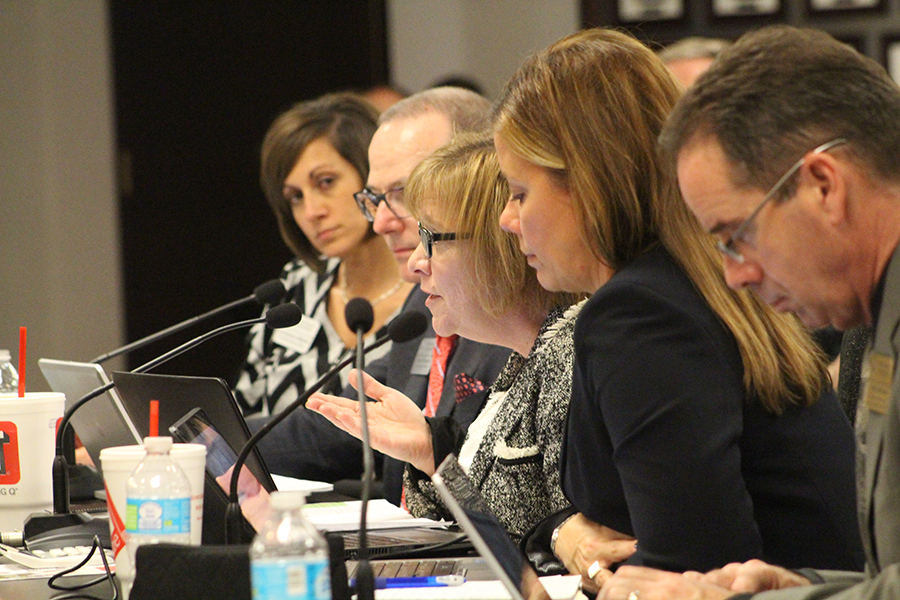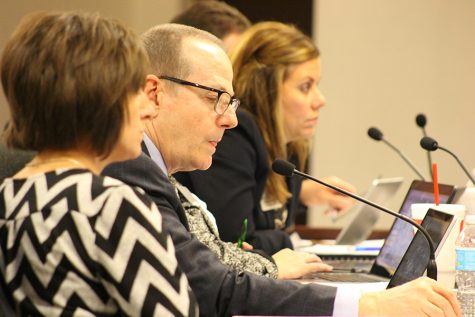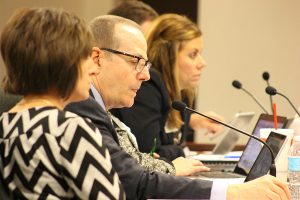Why Did Prop Howell Fail?
After community members voted down Proposition Howell on the Nov. 8 ballot, the board of education examines the reasons behind its defeat in order to look toward the future of the school district.
Credit to Savannah Wandzel)
Vice President Rene Cope and Director Mike Sommer sit together with other members of the board, discussing effects of Prop Howell failing to pass. The board members discuss the different cuts that the district may need to make for the 17-18 year.
Published: December 14, 2016
Millions of Americans held their breath during the presidential election on Nov. 8, but teachers, students and parents in FHSD awaited another result as well. FHSD presented Prop Howell to the voters as a 60 cent operating levy increase, costing an owner of a $200,000 home approximately $19 per month. The proposition failed, with about 48 percent of the voters in favor and 52 percent of the voters in opposition of Prop Howell.
A similar levy, Prop Y, of 90 cents was defeated in August 2015, with about 34 percent in favor of the proposition and about 66 percent voting against it. Prop Y was controversial to many because of both the size of the tax increase and the high price of the single-issue election.
“I think we gained much support from the previous time that we went out, and that was because of our communication effort,” Superintendent Mary Hendricks-Harris said. “Obviously we still have not reached 50 percent of people, so it was much improved, but it was not where we needed to be.”
The District has cut $20 million from the budget over the last five years, including more than $12 million from just the last two years. While these cuts were significant, they went largely unnoticed due to the District’s efforts to maintain student programs as much as possible.
“[Voters] didn’t understand it and they didn’t see the repercussions from Prop Y, so they just believed we had what we needed and we didn’t need any more,” senior Madison Clifton, school board student representative at the Nov. 17 meeting, said.
Any presidential election ensures a large voter turnout at the polls, but this one seemed to provoke especially strong voter opinions. Chief of Communications and Community Relations Matt Deichmann believes the atmosphere surrounding the election may have contributed to the levy failure, as people had many different opinions on the candidates for the presidency.
“We had two presidential candidates with historically low approval ratings, so I suspect there were a lot of people who went to the polls on election day to vote against someone or ‘no’ on something,” Deichmann said. “It was not a great environment for Proposition Howell. It was the perfect storm.”
As they are parents of a Central Elementary employee, retired couple Don and Lenora Funki supported Prop Howell from the beginning. But while personally understanding the necessity of the tax levy, they also believe that the District did not emphasize it enough to those without connections to FHSD. They imagine the proposal would have had greater community support had it been expressed more clearly as to what programs and materials the money from the tax levy would be funding.
“It would have been helpful to a lot of people if it was more definitive and transparent as to specifically where the money was going to go,” Don Funki said.
Following the failure of Prop Howell, it is now up to the Board of Education to determine where the district goes from here. More cuts will have to be made, and they are likely to have more severe long-term effects on the vitality of the student body and the school staffs, with topics such as transportation and classroom materials being mentioned in the talks of what could be cut for the years to come, until the district can find a way to increase funding.
“I do think it’s important to express gratitude to everybody that did support it,” Hendricks-Harris said. “We did have 48 percent of our community support it. We had our students, staff and community out working all the time to ensure that this conversation didn’t have to happen. What makes me sad is that in Francis Howell, we are having conversations about ‘Are we going to have books? Are we going to have buses? Are we going to have the support counselors that we need in schools?’. That conversation shouldn’t be happening in a district like ours.”








![FHN Holds Prom at Old Hickory Country Club [Photo Gallery]](https://FHNtoday.com/wp-content/uploads/2024/04/Brewer_stopmotion-9-300x200.jpg)
![FHN Students Watch the Solar Eclipse [Photo Gallery]](https://FHNtoday.com/wp-content/uploads/2024/04/4.8.24-solar-eclipse_-300x200.jpg)
![FHN Boys Varsity Volleyball Team Goes Against Troy [Photo Gallery]](https://FHNtoday.com/wp-content/uploads/2024/03/IMG_7545-300x200.jpg)
